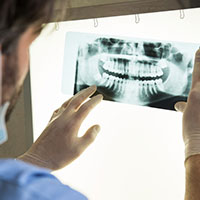 Dental X-Rays can tell a dentist a lot about your teeth and any underlying conditions that you might be suffering from. It gives them a clear picture of what’s going on inside your mouth without the need for a surgical incision.
Dental X-Rays can tell a dentist a lot about your teeth and any underlying conditions that you might be suffering from. It gives them a clear picture of what’s going on inside your mouth without the need for a surgical incision.
What’s the Purpose of an X-Ray?
X-rays give the dentist the ability to see inside your mouth and jaw without making a surgical incision. It’s the only way they can know for sure what is wrong. It also allows them to treat you precisely.
In the years before the invention of the X-ray machine, dentistry was an educated guessing game, at best. Nowadays, some dentists have advanced imaging machines that give a 3D image of your head, which allows them to view your jaw and teeth at different angles.
Are X-Rays Safe?
Dental X-ray machines have been in use for decades and are perfectly safe. Some people are fearful of the radiation that an X-ray machine puts out.
They have nothing to fear as the amount of radiation they get from a dental X-ray is so low, they would get more exposure if they were to stand out in their backyard for 24 hours.
There are, however, some small risks to getting an X-ray. Some people have super-sensitive skin and might break out in a small rash. You should also tell your dentist if you’re pregnant as any radiation that goes into your body will also be absorbed by your unborn baby as well.
How Are Dental X-Rays Taken?
When the dentist wants an X-ray of your mouth, you’re led from the office into the X-ray room. The dental assistant will sit you down in the reclining chair and place a lightweight lead vest over your chest. They will insert a kind of “camera film” (aka “Bitewings”) into your mouth around the area the dentist wants to see inside.
Once the dental assistant is satisfied that the bitewings are in the proper place, they will leave the room and press the X-ray button. The X-ray will be taken in a fraction of a second. The dental assistant will then remove the bitewings from your mouth and the lead vest from your chest.
A few minutes will go by, and the dental X-ray will be placed on a small back-lit board. The dentist will then come into the room, look at the X-rays and be able to determine what exactly is going on. They can even show you where the trouble spots are.
What Does the Dentist Look for in an X-Ray?
Since X-rays are a critical part of any dental treatment plan. They give the dentist a high-resolution image of your teeth, jawbone, and tissues of the mouth. The dentist will use them to look for problem areas or pinpoint and diagnose the exact area where you’re feeling tooth pain.
There are also several types of X-rays such as periapical, panoramic, and occlusal. Each X-ray allows the dentist to have a different view of your teeth and jaws, which will help him find exactly what he’s looking for.
X-rays allow dentists to:
- Monitor tooth health as part of a yearly annual examination.
- Check the health of the jawbone
- Look at tooth roots
- Locate cavities
- Locate the source of tooth pain.
- See the progression of developing teeth
- Look for the extent of periodontal disease
Dental Emergency – If you’ve suffered from a dental emergency such as a knocked-out tooth or broken jaw, the X-ray can tell the dentist exactly where the injury is located.
Pain-Related Issue – Dental X-Rays are most commonly used to solve pain-related issues such as TMJ or toothaches. When you have a tooth infection, you can only point out the general area of pain to the dentist. An X-ray can pinpoint precisely where the problem is and give the dentist a good idea of the severity of the infection and whether it has started to spread.
Surgery-Related – Before getting a tooth extraction, dental implants, or other surgical procedure, the dentist will often need an X-ray to give them a good idea of what they’re going to find once they make the first incision. It also allows them to know exactly where to cut without having to play the guessing game.
Yearly X-Rays – Dentists will often require an X-ray for an annual visit. It helps them locate cavities and potential trouble spots that would need dental work to prevent the situation from deteriorating any further.
Annual Dental Checkups in Chicago
If you haven’t had a dental checkup in over a year, there’s no better time than now to schedule one. It can help prevent major (and costly) dental issues that might crop up in a few months to a few years from now.
At Water Tower Dental Care, we can help improve your dental health via our annual dental checkups. Give us a call at (312) 787-2131 or schedule an appointment. Be sure to ask about our new patient dental exam special!






 Website Powered by Sesame 24-7™
Website Powered by Sesame 24-7™